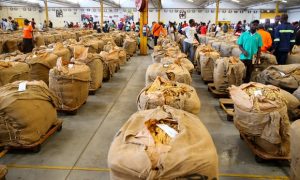
Continued inflationary pressures and a significant loss of value of existing wages coupled with the introduction of the mono currency resulted in employees requesting for an urgent review of the current minimum wage. Official inflation climbed by 40% since the last review, with food index inflation rising by over 60%.
Employees Position
Employees stated that prices of basic commodities had “skyrocketed” and the current wage was insufficient to purchase a basic basket of groceries. Transaction charges in the form of the 2% IMTT and bank/e-wallet charges were also eroding the value of their wages. Prices of goods and services were still being priced at parallel rates and not the official exchange, movement of which itself had caused further price increases since May. The current wage was proving insufficient for basic health care and schooling. In consideration of all these factors the employees demanded a minimum wage of ZWL$400.
Employers Position
Employers being farmers, recognized the importance of the welfare of their key asset i.e. labour force and the impact inflation continues to have on purchase power of the minimum wage. However, the employers themselves had not been spared in the following ways :
- There is no capacity to award higher wages. Most of the farmers in the general sector are struggling to pay the existing wages and allowances. A large number are in arrears and any additional wages will result in downsizing.
- A significant number of farmers are providing additional incentives e.g. basic food packs which takes the minimum employment package to close to ZWL$200. An increase in the wage, could see some employers removing this food pack or reducing the items.
- Payment for produce is done in a weakening RTGS currency with marginal profit and at times at no profit at all.
- The current ZESA load-shedding has badly affected production e.g. winter crops and already there has been a significant impact on yields on the wheat crop. Shortages of diesel and the cost of running high capacity generators have made the situation worse for farmers.
- Most agricultural inputs are either not available locally or are available at very high prices, e.g. ZWL$8000 for a tonne of fertilizer
- The government has issued SI 142 of 2019 banning the use of forex as a legal tender. Farmers need to fully understand this piece of legislation and see its effect on the pricing of goods, services and farm inputs.
- Government introduced statutory 145 of 2019 which stipulates that “No person or statutory body or company or entity shall sell or otherwise dispose of any maize except to a contractor or to the Grain Marketing Board.” The impact of this is unknown.
- The RBZ has rapidly moved the exchanges rates from 2.5 to 5 to 8.7 over short periods of time. This has resulted in inputs being priced at new exchange rates, yet many farmers sold their produce at an average rate of 5. This has hampered farmers’ ability to re-tool.
- With the introduction of SI 142 of 2019, usual funding of export crops in USD currency have been stopped and other forms of funding and support have been unclear.
- Contractors are currently reviewing the impact of SI 142 of 2019 and unstable exchange rates on their future investments with farmers, and as a result some have concerns over commitments for the 2019/20 season funding model.
- The Government has forecasted in the coming months a slow down inflation and a significant decline in prices of goods and services.
- Prevailing economic fundamentals are currently too unstable to make any informed decisions at this moment.
In light of all the above, employers would like to appeal that wage reviews should be put on hold until there clarity on the government’s efforts to bring sanity in the economic environment.
Negotiation Process
After further dialogue and listening to the heads of arguments made by employers, employees reduced their wage demand to ZWL$350. As employers we remained at a nil review of the wage but offered a cost of living allowance (COLA ) 11%, in light of the increased inflation on basics food items and medical care. The employees, though appreciating the COLA, rejected it demanding an increase in the wage. After further engagement, the parties reached an agreement. A new minimum wage of ZWL$195, effective 01 July 2019 was settled on.
The impact of the wage means that employees B4 and above will be subject to PAYE, which will be an administrative headache for employers. We are engaging with the Ministry of Finance to have the tax bracket widened in order to protect these workers and prevent additional administrative work.
It was sad to note the split in employers positions during the negotiations. Following restructuring, some employers representatives are new to the negotiation process while some sent representatives not knowledgeable in the processes involved. This left the initial united employers position exposed and weakened.
We acknowledge that the wage is much higher than what was forecasted however hope the economic fundamentals become stable and wage reviews will revert to being once in a year.
There are no changes to allowances.
There will be reviews of all sectors wages.
Zimbabwe Tobacco Association
Post published in: Agriculture

